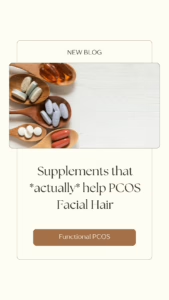- Share on Pinterest (Opens in new window)Pinterest
- Share using Native toolsShareCopied to clipboard
- Share on X (Opens in new window)X
Best Supplements for PCOS Facial Hair
Evidence-based supplements that actually help your PCOS hirsutism.
If you’re dealing with PCOS facial hair, you’ve probably Googled everything under the sun hoping to find supplements to reduce facial hair growth or even just some answers. And I get it, when you’re tired of shaving, tweezing, and hiding, you’re ready to try anything that might help. Along with lifestyle changes that reduce facial hair growth, that’s where the best supplements for PCOS facial hair come in to help make this issue a lot less stressful!
I’ve been there myself. I may be a PCOS expert, but I earned that expertise partially through my own journey with PCOS and the facial hair was one of the hardest parts to treat.
The good news? Some supplements actually can help reduce facial hair when they’re part of a targeted, root-cause approach.
I created this guide to walk you through the best PCOS facial hair supplements: why they work, what the science says, and how to take them.

First, Why Do Supplements Help With PCOS Facial Hair?
Facial hair (hirsutism) in PCOS is largely driven by excess androgens, specifically free testosterone and its more potent form, DHT (dihydrotestosterone). I discuss all of this in my article on PCOS facial hair here.
Supplements can help by:
Supporting ovulation and hormonal balance
Reducing insulin resistance and inflammation (which drive androgen excess)
Improving detox and antioxidant status
Binding or blocking the hormones that trigger hair follicles
There are many supplemenst for PCOS facial hair but only a few I’d classify as the “best” supplements for PCOS facial hair and that’s because they help work on root cause issues in PCOS as well as on the hair growth itself which is likely to get you better long term results. Let’s break it down supplement by supplement.
1. Zinc and PCOS facial Hair | Best Supplements for PCOS Facial Hair
Best for: Ovulation, lowering androgens, improving progesterone
Zinc is one of the most important (and underrated) supplements for PCOS facial hair. It helps:
Lower androgens like testosterone and DHEA
Raise progesterone by supporting ovulation
Support immune and skin health
Many women with PCOS are zinc-deficient especially if they’ve taken hormonal birth control in the past. I recommend including more zinc containing foods into your diet to help replenish your nutrients, but for facial hair it usually works quicker to take a supplement.
I have personally taken zinc for my facial hair growth with good success. It was one of the first supplements that I could tell was really slowing down the hair growth.
Food sources: Oysters, beef, legumes
Best form: Zinc picolinate
General dose: 30 mg daily
Use a therapeutic quality zinc for the most potency. This is my recommended zinc and is the one I personally take.
2. N-acetyl cysteine (NAC) and PCOS facial hair | Best Supplements for PCOS Facial Hair
Best for: Reducing oxidative stress and androgen production
NAC is a precursor to glutathione, the body’s master antioxidant. It helps:
Lower oxidative stress, which worsens insulin resistance and drives androgen production
Improve insulin sensitivity
Support detox (especially from environmental hormone disruptors)
This is one of my personal favorites and many people with PCOS tend to have lower levels.
Food sources: Onion, broccoli, animal protein
General dose: 500–1000 mg daily. I recommend this NAC which comes in 500 mg a day- start with 1 and try 2 if you tolerate it well.
3. Inositols (Myo + D-chiro)| Best Supplements for PCOS Facial Hair
Best for: Insulin resistance and ovulatory PCOS
Inositols are naturally occurring compounds that help the body respond to insulin. They’ve been shown to:
Improve ovulation
Lower testosterone
Reduce inflammation
Reduce hair growth over time, especially when insulin resistance is a factor
The 40:1 Myo to D-chiro ratio is what’s consistently been shown to be best for PCOS facial hair because it’s the ratio found naturally in the body. Many supplements on the market contain only one or the other or the wrong ratio so be careful here.
Food sources: Whole grains, nuts
General dose: 2000 mg daily (this is the one I recommend and comes with an extra antioxidant boost!)
4. Vitamin D | Best Supplements for PCOS Facial Hair
Best for: Inflammation, insulin resistance, and hormone regulation
Low vitamin D is incredibly common in PCOS and is linked to:
Increased insulin resistance
Hormonal dysregulation
Poor immune and metabolic function
- More irregular periods
Correcting a deficiency can help support ovulation, reduce androgens, and ease symptoms like facial hair. Ideally, you’d get your levels of Vitamin D tested so you know how much is best for supplementing. I typically see pretty low Vitamin D levels in PCOS and that contributes to a range of issues. Sometimes I have to supplement up to 10,000 iu per day but testing is key if doing those higher doses. You can test this at home with a kit like this.
Food sources: Fatty fish, eggs, sunlight
Best form: D3
General dose: 2000–5000 IU daily
This is my recommended Vitamin D because it comes with the ideal amount of Vitamin K that helps absorption and is also great for heart health.
5. Cyprus Rotundus Oil | Best Supplements for PCOS Facial Hair
This amazing oil has a high level of polyphenols that can block androgenic affects on hair follicles. Recent studies have found is as effective as laser hair removal in some people and it works great as an adjunct to everything else.
Cyperus Rotundus Oil for PCOS: Effective Facial Hair Solutions
I have personally found it to substantially reduce my PCOS facial hair growth and highly, highly recommend it. So much so that I updated this article in July of 2025 to recommend cyprus rotundus oil as one of the best supplements for PCOS facial hair! As of the writing of this article, it’s still relatively unknown and pretty cheap as a consequence and definitely worth trying to see if it works for you! The cyprus rotundus oil that has worked the best on my facial hair has been this one, I like that it comes already with the carrier oils so it doesn’t burn the skin.
6. Spearmint Tea | Best Supplements for PCOS Facial Hair
Spearmint tea is well-studied as one of the best supplements for PCOS facial hair and has been shown to significantly reduce circulating androgens that lead to increased facial hair growth in PCOS. Although not technically a supplement, spearmint tea for PCOS acts similarly. If you drink about two cups per day, you should see reductions in pcos facial hair growth over time! Powerful Benefits of Spearmint Tea for PCOS (& how to grow your own)
Quick Note on Safety
These supplements are powerful—especially when stacked together in a strategic plan. But that also means:
You should always talk to a licensed practitioner before starting anything new
Doses may need to be adjusted for your labs and symptoms
If you want tailored guidance, my Facial Hair Freedom course walks you through labs, supplements, dosages, and how to build a root-cause plan that works for your body.
Best Supplements for PCOS Facial Hair
Whether you’re just getting started or you’ve been trying to manage this for years, I hope some of these tips and advice help you. I highly recommend looking through some of my other content on PCOS nutrition so that you’re addressing the other root causes of your symptoms. Check out my PCOS articles for more
- Share on Pinterest (Opens in new window)Pinterest
- Share on X (Opens in new window)X
- Share using Native toolsShareCopied to clipboard

6 Best Supplements for PCOS Facial Hair |Evidence Based & Effective
Amber Fischer, MS, CNS, Functional Nutritionist
June 20, 2025
MEdical Disclaimer
The information contained on amberfischernutrition.com is for informational and education purposes only and should not be construed as medical advice. As a nutrition professional, I draw upon evidence based practices and personal experience with myself and clients to form recommendations like the ones made in this guide. You are an individual with your own unique set of health goals and concerns. Ensure you discuss any changes to your diet with a qualified healthcare professional, like your doctor, to ensure these changes are right for you. This is especially important if you have any other underlying medical conditions. Do not consume foods you are allergic to. Results will be individual and will vary.
Affiliate Disclosure
This site contains affiliate links. When you make a purchase through a link provided on this website, I may make a small commission. This does not add to the purchase price of the item. I only link to items I truly use and recommend.